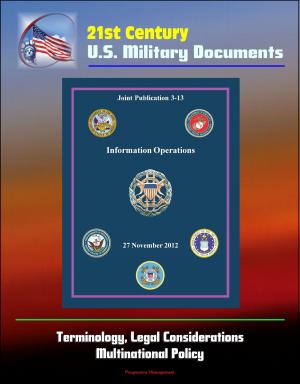Cultural Intelligence for the Commander: A Necessary Ingredient - The Japanese in World War II, Lessons from Operation Iraqi Freedom, Emerging Threat of Terrorism, Need for Actionable Intelligence
Nonfiction, History, Military, Strategy, Social & Cultural Studies, Political Science| Author: | Progressive Management | ISBN: | 9780463631409 |
| Publisher: | Progressive Management | Publication: | May 20, 2018 |
| Imprint: | Smashwords Edition | Language: | English |
| Author: | Progressive Management |
| ISBN: | 9780463631409 |
| Publisher: | Progressive Management |
| Publication: | May 20, 2018 |
| Imprint: | Smashwords Edition |
| Language: | English |
This excellent report has been professionally converted for accurate flowing-text e-book format reproduction.
How many more American lives will be lost before we accept the fact that we live in a multi-cultural world where not everyone thinks like we do? It is imperative that intelligence systems incorporate significant cultural scrutiny into all aspects of painting the battle-space.
Virtually all commanders embrace the notion that being forewarned is forearmed. It has always been important to have a complete understanding of our adversaries' culture. It is even more important now that we have been alerted to the emerging terrorist threat and are decisively engaged in the full spectrum of military operations. The need for J2s to consolidate and incorporate cultural intelligence into their enemy assessment to improve the value of credible and actionable intelligence to the Regional Combatant Commander (RCC) has never been greater. The 21st century is upon us, and we are now arrayed against distinctive adversaries with dramatically different cultures. This new threat increases the nature of issues intelligence is asked to address and the nature of the information that bears on those issues. One significant source of information that has been under-utilized is that of the adversary's culture. If intelligence is truly about knowing the enemy, we need to rethink how cultural intelligence can be used to support operations. Today intelligence systems and processes remain tuned to the Cold War. Subsequently, paradigms established by theater J2s do not assess or effectively analyze the cultural aspect of an enemy's values, beliefs, or behaviors to the effort required. Our current inability to factor cultural background into our analysis leaves us subject to unnecessary ignorance and indecision. Lack of cultural intelligence will lead to misperception, misinterpretation, and misrepresentation of the enemy that could have adverse effects on military operations. On the other hand, a firm grasp of the adversary's culture can facilitate achieving operational objectives with far less consequences Culture profoundly influences the intent and actions of our adversaries. Instead of treating it as an obstacle to be "worked around" we should strive to use it as an asset - a lens that can help us identify their critical vulnerabilities.
Abstract * Introduction * Cultural Confusion; A historic perspective * The Emerging Threat * Operation Iraqi Freedom * Recommendation * Conclusion * Footnotes * Bibliography
This excellent report has been professionally converted for accurate flowing-text e-book format reproduction.
How many more American lives will be lost before we accept the fact that we live in a multi-cultural world where not everyone thinks like we do? It is imperative that intelligence systems incorporate significant cultural scrutiny into all aspects of painting the battle-space.
Virtually all commanders embrace the notion that being forewarned is forearmed. It has always been important to have a complete understanding of our adversaries' culture. It is even more important now that we have been alerted to the emerging terrorist threat and are decisively engaged in the full spectrum of military operations. The need for J2s to consolidate and incorporate cultural intelligence into their enemy assessment to improve the value of credible and actionable intelligence to the Regional Combatant Commander (RCC) has never been greater. The 21st century is upon us, and we are now arrayed against distinctive adversaries with dramatically different cultures. This new threat increases the nature of issues intelligence is asked to address and the nature of the information that bears on those issues. One significant source of information that has been under-utilized is that of the adversary's culture. If intelligence is truly about knowing the enemy, we need to rethink how cultural intelligence can be used to support operations. Today intelligence systems and processes remain tuned to the Cold War. Subsequently, paradigms established by theater J2s do not assess or effectively analyze the cultural aspect of an enemy's values, beliefs, or behaviors to the effort required. Our current inability to factor cultural background into our analysis leaves us subject to unnecessary ignorance and indecision. Lack of cultural intelligence will lead to misperception, misinterpretation, and misrepresentation of the enemy that could have adverse effects on military operations. On the other hand, a firm grasp of the adversary's culture can facilitate achieving operational objectives with far less consequences Culture profoundly influences the intent and actions of our adversaries. Instead of treating it as an obstacle to be "worked around" we should strive to use it as an asset - a lens that can help us identify their critical vulnerabilities.
Abstract * Introduction * Cultural Confusion; A historic perspective * The Emerging Threat * Operation Iraqi Freedom * Recommendation * Conclusion * Footnotes * Bibliography















